David Tallerman's Blog, page 41
April 16, 2014
Got a (Par)sec?
I don't pay a huge amount of attention to awards, having failed to win any since I was seven, but I got a nice e-mail from Pseudopod's Shawn Garrett the other day and I thought I'd break my rule, especially since it's not really a rule anyway but more a habit or vague inclination.
Shawn happened to mention in passing that the nominations period for the Parsec awards - a celebration of speculative fiction podcasting, as their website banner usefully points out - is open, and pointed out too that not only is Pseudopod itself eligible for "Best Speculative Fiction Magazine or Anthology Podcast" but that my story Prisoner of Peace (along with almost everything Pseudopod publishes) is potentially nominatable in the category of "Best Speculative Fiction Audio Drama (Short Form)".
As you surely know if you listen to it on even the most semi-regular of bases, Pseuodpod is great and entirely worthy of a nomination. However, since winning another award, or even being nominated for one, would probably just detract from that one blazing moment twenty eight years ago, I won't ask that anyone put my name forward for Prisoner of Peace.
It is, however, surely the best horror story I've written, or at least my own personal favourite. A tale once described as "Oldboy meets Memento in a prison cell somewhere just west of Hell," (by me, in fact, just then), it's certainly amongst the parts of my work that I'd most like to see nominated for an award or seven. Here's the link again, in case you missed it before.
Still, like I said, it would be a genuine shame to dim the glory of that seven-year old me's triumph. As Oscar Wilde possibly said, unless I just made it up, some moments shine too brightly to be tarnished with the tawdriness of repetition.
But you should totally nominate Pseuodpod, yes you should. And if, while you were at it, you felt an unaccountable urge to mention my story too, well, however much the part of me that will always be that skinny seven year old, clutching his trophy or whatever the hell it was I won, standing in the floodlights and...
Wait, I'm pretty sure my school never had floodlights. Maybe I just dreamed the whole thing. Oh all right then, nominate Prisoner of Peace if you're so damned determined.
I promise not to hold it against you.
Shawn happened to mention in passing that the nominations period for the Parsec awards - a celebration of speculative fiction podcasting, as their website banner usefully points out - is open, and pointed out too that not only is Pseudopod itself eligible for "Best Speculative Fiction Magazine or Anthology Podcast" but that my story Prisoner of Peace (along with almost everything Pseudopod publishes) is potentially nominatable in the category of "Best Speculative Fiction Audio Drama (Short Form)".
As you surely know if you listen to it on even the most semi-regular of bases, Pseuodpod is great and entirely worthy of a nomination. However, since winning another award, or even being nominated for one, would probably just detract from that one blazing moment twenty eight years ago, I won't ask that anyone put my name forward for Prisoner of Peace.
It is, however, surely the best horror story I've written, or at least my own personal favourite. A tale once described as "Oldboy meets Memento in a prison cell somewhere just west of Hell," (by me, in fact, just then), it's certainly amongst the parts of my work that I'd most like to see nominated for an award or seven. Here's the link again, in case you missed it before.
Still, like I said, it would be a genuine shame to dim the glory of that seven-year old me's triumph. As Oscar Wilde possibly said, unless I just made it up, some moments shine too brightly to be tarnished with the tawdriness of repetition.
But you should totally nominate Pseuodpod, yes you should. And if, while you were at it, you felt an unaccountable urge to mention my story too, well, however much the part of me that will always be that skinny seven year old, clutching his trophy or whatever the hell it was I won, standing in the floodlights and...
Wait, I'm pretty sure my school never had floodlights. Maybe I just dreamed the whole thing. Oh all right then, nominate Prisoner of Peace if you're so damned determined.
I promise not to hold it against you.
Published on April 16, 2014 12:28
April 10, 2014
Writing Ramble: How to Write a Synopsis
I recently found myself asked to critique a novel synopsis written by a friend of a friend, and since my critiquing ended up as more of a how-to-write-a-synopsis guide, I thought it would be worth reproducing here:
A synopsis should be a summary of your entire plot, from beginning to end, leaving out no significant detail, character or development. However, the plot is the thing: characters and places need only be described with the bare details that allow a reader to understand their behaviour within the story. A synopsis should begin at the beginning and continue chronologically to the end, including any twists and eleventh hour developments. Plot threads should be incorporated more or less as they arise in the book itself, although some simplification is obviously okay and necessary; it's fine to say "meanwhile" or "on the other side of town" or whatever.
A synopsis shouldn't try to trick, mislead or tease the reader - plot twists should be revealed as they arise rather than as characters discover them - and although it's a good thing if it's entertaining, it shouldn't really try to entertain either. Its first and most crucial role is to convey to someone with no knowledge of your story exactly what happens; the important thing is that by the end the reader knows exactly what your story is. Of course, the really important thing is that they both know your story and are intrigued to read it in full, but the only way to achieve that is to write a good enough story in the first place and then to convey it as clearly and succinctly as possible. Trying to persuade the reader simply won't work; it's their job to know better than that.
With that in mind, there should be no trace of you the author in a synopsis. An editor has no interest in you, (at this stage, anyway), only your story. Never refer to "my novel" and never refer to the story as a story, or plot twists as plot twists, or strands as strands. In fact, write it as if you're describing a really fantastic story by someone else, and your only goal is to express it as clearly as possible so that other people can see for themselves how great it is. A synopsis is as much a storytelling vehicle as the book it describes, and should be readable as a story in its own right, albeit a spartan and abbreviated one.
Editors and agents will likely ask for either a three page or a one page synopsis. Write both. (I write the three page first and compress it, but whatever works.) Use every word you can cram in without making the formatting unpleasant to read; writing a synopsis that fills half a page implies that you haven't enough plot to talk about for an entire page. Play around with margins and paragraphs if you have to. Single space, unless it makes the text look cramped. It should be a challenge to say everything you want to say in such a tiny space, not the other way around. But the end result should be comfortable on the eye. Your goal at every stage is firstly to not put the reader off - with typos, bad formatting, rambling sentences, lapses of professionalism - and then, once you've convinced them you're not wasting time, to persuade them they'd like to read your novel and possibly purchase / represent it. But if you can't get past the first stage, you'll never stand a chance at the second.
Lastly ... a synopsis should be as well written, edited and formatted as your novel, or even more so. It should be your storytelling at its absolute best, lucid and concise. Use clear, short sentences. Make the spelling and grammar impeccable. If you can't write a flawless one page synopsis, no editor is going to feel enthusiastic about wading through however-many-hundred pages of your novel.
Oh, and as with all things writing-related, use a clear font, Times New Roman or Courier New. Use a common file format, .rtf or .doc; anything else is likely to be deleted unread. If in doubt, I go for .rtf.
A synopsis should be a summary of your entire plot, from beginning to end, leaving out no significant detail, character or development. However, the plot is the thing: characters and places need only be described with the bare details that allow a reader to understand their behaviour within the story. A synopsis should begin at the beginning and continue chronologically to the end, including any twists and eleventh hour developments. Plot threads should be incorporated more or less as they arise in the book itself, although some simplification is obviously okay and necessary; it's fine to say "meanwhile" or "on the other side of town" or whatever.
A synopsis shouldn't try to trick, mislead or tease the reader - plot twists should be revealed as they arise rather than as characters discover them - and although it's a good thing if it's entertaining, it shouldn't really try to entertain either. Its first and most crucial role is to convey to someone with no knowledge of your story exactly what happens; the important thing is that by the end the reader knows exactly what your story is. Of course, the really important thing is that they both know your story and are intrigued to read it in full, but the only way to achieve that is to write a good enough story in the first place and then to convey it as clearly and succinctly as possible. Trying to persuade the reader simply won't work; it's their job to know better than that.
With that in mind, there should be no trace of you the author in a synopsis. An editor has no interest in you, (at this stage, anyway), only your story. Never refer to "my novel" and never refer to the story as a story, or plot twists as plot twists, or strands as strands. In fact, write it as if you're describing a really fantastic story by someone else, and your only goal is to express it as clearly as possible so that other people can see for themselves how great it is. A synopsis is as much a storytelling vehicle as the book it describes, and should be readable as a story in its own right, albeit a spartan and abbreviated one.
Editors and agents will likely ask for either a three page or a one page synopsis. Write both. (I write the three page first and compress it, but whatever works.) Use every word you can cram in without making the formatting unpleasant to read; writing a synopsis that fills half a page implies that you haven't enough plot to talk about for an entire page. Play around with margins and paragraphs if you have to. Single space, unless it makes the text look cramped. It should be a challenge to say everything you want to say in such a tiny space, not the other way around. But the end result should be comfortable on the eye. Your goal at every stage is firstly to not put the reader off - with typos, bad formatting, rambling sentences, lapses of professionalism - and then, once you've convinced them you're not wasting time, to persuade them they'd like to read your novel and possibly purchase / represent it. But if you can't get past the first stage, you'll never stand a chance at the second.
Lastly ... a synopsis should be as well written, edited and formatted as your novel, or even more so. It should be your storytelling at its absolute best, lucid and concise. Use clear, short sentences. Make the spelling and grammar impeccable. If you can't write a flawless one page synopsis, no editor is going to feel enthusiastic about wading through however-many-hundred pages of your novel.
Oh, and as with all things writing-related, use a clear font, Times New Roman or Courier New. Use a common file format, .rtf or .doc; anything else is likely to be deleted unread. If in doubt, I go for .rtf.
Published on April 10, 2014 09:04
April 3, 2014
The Sci-Fi Weekender 2014
 For some reason, I find myself not wanting to say anything bad about this year's Sci-Fi Weekender.
For some reason, I find myself not wanting to say anything bad about this year's Sci-Fi Weekender. Which isn't to suggest that it was great or anything, only that I can't work up much enthusiasm to be mean about it. I guess it's just hard to be enthusiastically negative about something so unenthusiastically average.
Also, in fairness, I knew what I was getting myself into, having heard no end of horror stories about last year's event, and mostly went because I thought it might be a nice, cheap mini-break in Wales - which it was for the most part, and certainly would have been if I hadn't been recovering from a vicious bout of flu. I have no right to moan, (except about the flu), and in fact should probably count myself lucky that I got to play mini-golf and sit on a beach in late March.
So - due to some planning that could kindly be described as eccentric - all three of my events were on the Saturday and within the same four hour period. That, combined with the whole flu thing, combined with the fact that I was kicking off by moderating for only the second time and after that on a damn panel show, had left my nerves quite frayed. And that nerve-fraying wasn't helped by the fact that the previous panel overran because there was no one except a comically grumpy sound engineer (who kept assuring us that while we might talk about science, what he was doing was real science) to manage the stage, or the fact that the panels were being held in the middle of a large hall in which most of the rest of the Con was - very loudly - going on.
But once we got started - we being Danie Ware, Bryony Pearce, Gareth L. Powell and Kim Lakin-Smith, speaking on the nebulous topic of Fantasy Writing: The Myths Exploded - things went solidly. I forgot to get everyone to announce themselves and my carefully prepared questions ran out at about the forty minute mark, but my panelists were brilliant and covered admirably for the fact that I hadn't really understood the question. (What are these so-called myths? Not knowing, I made a load up. But in retrospect I think I could have gone further. "Why is Fantasy perceived as being obsessed with marsupials," that kind of thing.)
With the myths of Fantasy writing well and truly exploded and their ashes stamped upon, I had time for a quick lunch and then it was off to be a part of Just a Minute, live in front of a whole hell of a lot of people. Quite how my name had ever been arrived upon as someone with the quick wits and unerring confidence required to play Just a Minute before a live audience I shall likely never know, but I'd been mad enough to agree to it and I was determined to make the best of it, even if "the best" meant passing out through sheer terror on stage.
 Me, Jonathon Green (Probably sucking up, or thinking about it.)
Me, Jonathon Green (Probably sucking up, or thinking about it.)Looking back, I can't believe that's not what happened, but I have fractured memories of getting out there and even saying a few things, although ... and I'm being honest here ... I am absolutely abysmal at Just a Minute and should never be allowed, let alone encouraged to play again. There was a moment when it seemed I might not come last, which was the most I'd dared hope for, and an eloquent monologue about how sloths are nature's fluffy backpacks coupled with stealing a point by successfully accusing Jonathon Green of sucking up (he was) had left me feeling very slightly confident. But it soon became apparent that I was entirely terrible and appropriately doomed, and inevitably I was beaten by fellow contestants Gareth Powell (winning for the second year, and judging by his performance, having spent the entire intervening time practicing), Jonathan and Steve Lockley.
 See?
See? Last up there was a panel on merging genres, which due to the aforementioned eccentric programming schedule and my inability to transmute time and space I arrived late at. But by that point I had no more nervousness left, and so blundering up on stage to join an already on-the-go panel with Simon Clark, Theresa Derwin, Paul Lewis, Danie Ware (again) and Sara Jane Townsend was no big thing. In fact, by that point I was quite enjoying myself, and possibly delirious. At any rate, I remember talking quite a lot, Sara did a sterling job on the moderating front, and it all seemed to go off without a hitch.
Writing it all down like this, I guess the reason I don't want to badmouth the Sci-Fi Weekender is that, in a crazy way, I had fun there. And everyone else seemed to be having fun too, even if it wasn't always obvious why. And fun is good, there's no two ways about it. Would I have rather gone to a well organised conference with a surplus of cool stuff to do and some slightly more imaginative panel topics? Hell yes. Will I go to next year's Sci-Fi Weekender should anyone ask me? Probably not. But is there fun to be had surrounded by Storm Troopers and Daleks and not one but three Judge Dredds in North Wales? I guess, if you squint hard, there is.
Published on April 03, 2014 12:04
March 20, 2014
To End All Wars: Half Way!
I promised I wouldn't post every time I hit a landmark on new novel-in-progress To End All Wars, (at any rate I promised myself), but I didn't feel like I could let passing the half way point go without a brief mention.
Right now, I've written thirteen chapters of what, if all goes to plan, will be a novel of twenty three chapters, placing me comfortably on target to finish the first draft by the end of May. The wider significance of all this is that, for the first time since my somewhat-disastrous experiment four years ago, I'm trying to write a novel full time, and to say there's a lot resting on it would be kind of an understatement. One of my conditions to myself for being allowed to have a go at this full time writing lark was that I can produce at least - at least! - two novels a year, and that May deadline is an important landmark in proving I can pull that off.
What's perhaps even more important, though, is that not only am I on target with To End All Wars, I'm on target with everything else too. In the last two and a half months, I've written two short stories and the first issue of a new comic book series, plowed through hundreds of pages of research, and mostly planned out the second novel I'll be starting this year, the book formerly known as War For Funland, which I hope to start come April ... meaning that for the first time in my life I'll be attempting to write two novels back to back. Not to mention more short fiction and the various other smaller projects I'm working around those two monoliths. Which, when you've been struggling to write a novel a year, sounds a bit crazy written down. But hey, these are crazy times!
And once again I've attempted to talk about To End All Wars and rambled on about every other damn thing instead. This shouldn't be taken as any indication of how excited I am by it or how well it's going - it's going very well and I'm exceedingly excited about it - but more a sign of how giddy I am to finally be able to throw myself at every damn project I feel like. But yeah, TEAW is shaping up nicely, and in fact every bit as well as I could have hoped it would. One of these days I'll have to write a post that does more than just mention it in passing...
Right now, I've written thirteen chapters of what, if all goes to plan, will be a novel of twenty three chapters, placing me comfortably on target to finish the first draft by the end of May. The wider significance of all this is that, for the first time since my somewhat-disastrous experiment four years ago, I'm trying to write a novel full time, and to say there's a lot resting on it would be kind of an understatement. One of my conditions to myself for being allowed to have a go at this full time writing lark was that I can produce at least - at least! - two novels a year, and that May deadline is an important landmark in proving I can pull that off.
What's perhaps even more important, though, is that not only am I on target with To End All Wars, I'm on target with everything else too. In the last two and a half months, I've written two short stories and the first issue of a new comic book series, plowed through hundreds of pages of research, and mostly planned out the second novel I'll be starting this year, the book formerly known as War For Funland, which I hope to start come April ... meaning that for the first time in my life I'll be attempting to write two novels back to back. Not to mention more short fiction and the various other smaller projects I'm working around those two monoliths. Which, when you've been struggling to write a novel a year, sounds a bit crazy written down. But hey, these are crazy times!
And once again I've attempted to talk about To End All Wars and rambled on about every other damn thing instead. This shouldn't be taken as any indication of how excited I am by it or how well it's going - it's going very well and I'm exceedingly excited about it - but more a sign of how giddy I am to finally be able to throw myself at every damn project I feel like. But yeah, TEAW is shaping up nicely, and in fact every bit as well as I could have hoped it would. One of these days I'll have to write a post that does more than just mention it in passing...
Published on March 20, 2014 13:13
March 12, 2014
War For Funland No More (But in a Good Way)
Back in the harsh winter-stroke-spring of 2010, I did a strange and possibly a stupid thing: I packed in a well paid IT contract to take a break for four months, live off my savings and write a new novel. That novel was War For Funland, which you may remember from...
No, wait. You haven't read it, or, unless you religiously follow this blog and have an astounding memory, even heard of it. Because I never finished a second draft, let alone got it published.
So what went wrong?
Well, it didn't, exactly; except that it sort of did. It's not untrue to say that the reason that second draft never happened was that not long after I finished I got a deal for my first novel Giant Thief, plus sequels, and suddenly there was no time in the world for poor, languishing War For Funland. But it's just as true - and maybe a little truer - that the reason I never went back to it was that writing it in the first place had been such a demoralizing experience. It was an experiment, and not one that had particularly worked; not so much the book itself, that is, but the whole endeavor. I realised quickly that I might have inadvertently ended my IT career, and thus would quickly run out of money and find myself stacking shelves or gun-running or something, and also that I couldn't properly write a book in four months or whatever stupid amount of time I'd allotted myself. It didn't help that I hadn't done enough planning, and was trying to knock out two thousand words a day with no time for digging myself out of plot holes, of which I soon discovered there were a multitude.
I battled on, but by the time I got to the end, for all that I'd finished a novel and in about a sixth of the time my first had taken, there was a sense of failure hanging over the project. Enough that the thought of going back to wrangle War For Funland into some kind of meaningful, potentially publishable shape didn't exactly fill me with glee.
But it turned out that the one thing worse that trying to re-edit your not-quite-successful second novel is giving up on it and all those agonizing months of work. And I'd always figured that if I didn't return to it before, I'd do it now, after I'd gone full time as a writer, when I had no possible excuse not to. Even then, though, I wasn't enthusiastic. War For Funland was my big failure, after all, the book full of plot holes and copious flaws, written at a hopelessly breakneck pace ... even reading through it to work out what I could salvage wasn't a fun prospect.
Well, it turned that it wasn't that bad. I mean, it really wasn't. It was, in fact, in places, pretty good. There were chunks, some of them surprisingly large, that I was very happy with. There were times when I found myself getting so caught up that I forgot I'd written it in the first place. And what cheered me the most was that I could see my writing getting better, chapter by chapter; I'd spent so long thinking of the whole endeavor as a mistake that I'd never realised just how much I'd improved for doing it.
At any rate, I've come to the conclusion that War For Funland is absolutely salvageable, and I've no doubt now that there are the makings of a good book in there. Except that a second draft isn't going to get me to that point. What I'm looking at now is more a from scratch rewrite - which I'll be starting come next month. My thinking at the minute is that I'll be scrapping two thirds to three quarters of the existing stuff. Drastic, sure, but necessary if it's ever going to be the book I hope it can be.
Oh, and it's not called War For Funland anymore. But I'm perhaps a bit too free and easy in announcing my titles, so let's just say it is for the moment.
(It isn't.)
No, wait. You haven't read it, or, unless you religiously follow this blog and have an astounding memory, even heard of it. Because I never finished a second draft, let alone got it published.
So what went wrong?
Well, it didn't, exactly; except that it sort of did. It's not untrue to say that the reason that second draft never happened was that not long after I finished I got a deal for my first novel Giant Thief, plus sequels, and suddenly there was no time in the world for poor, languishing War For Funland. But it's just as true - and maybe a little truer - that the reason I never went back to it was that writing it in the first place had been such a demoralizing experience. It was an experiment, and not one that had particularly worked; not so much the book itself, that is, but the whole endeavor. I realised quickly that I might have inadvertently ended my IT career, and thus would quickly run out of money and find myself stacking shelves or gun-running or something, and also that I couldn't properly write a book in four months or whatever stupid amount of time I'd allotted myself. It didn't help that I hadn't done enough planning, and was trying to knock out two thousand words a day with no time for digging myself out of plot holes, of which I soon discovered there were a multitude.
I battled on, but by the time I got to the end, for all that I'd finished a novel and in about a sixth of the time my first had taken, there was a sense of failure hanging over the project. Enough that the thought of going back to wrangle War For Funland into some kind of meaningful, potentially publishable shape didn't exactly fill me with glee.
But it turned out that the one thing worse that trying to re-edit your not-quite-successful second novel is giving up on it and all those agonizing months of work. And I'd always figured that if I didn't return to it before, I'd do it now, after I'd gone full time as a writer, when I had no possible excuse not to. Even then, though, I wasn't enthusiastic. War For Funland was my big failure, after all, the book full of plot holes and copious flaws, written at a hopelessly breakneck pace ... even reading through it to work out what I could salvage wasn't a fun prospect.
Well, it turned that it wasn't that bad. I mean, it really wasn't. It was, in fact, in places, pretty good. There were chunks, some of them surprisingly large, that I was very happy with. There were times when I found myself getting so caught up that I forgot I'd written it in the first place. And what cheered me the most was that I could see my writing getting better, chapter by chapter; I'd spent so long thinking of the whole endeavor as a mistake that I'd never realised just how much I'd improved for doing it.
At any rate, I've come to the conclusion that War For Funland is absolutely salvageable, and I've no doubt now that there are the makings of a good book in there. Except that a second draft isn't going to get me to that point. What I'm looking at now is more a from scratch rewrite - which I'll be starting come next month. My thinking at the minute is that I'll be scrapping two thirds to three quarters of the existing stuff. Drastic, sure, but necessary if it's ever going to be the book I hope it can be.
Oh, and it's not called War For Funland anymore. But I'm perhaps a bit too free and easy in announcing my titles, so let's just say it is for the moment.
(It isn't.)
Published on March 12, 2014 13:58
March 8, 2014
After Death Stoker-Nominated
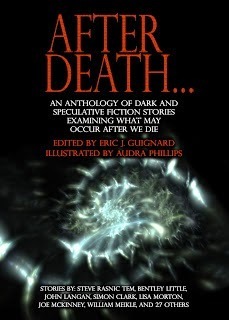 Another year, another Best Anthology Bram Stoker award nomination for top editor Eric J. Guignard, who I imagine as sitting right now in a huge armchair, possibly smoking a pipe, sighing with ennui at the fact that his second ever anthology has been nominated for a top industry award just like his first, Dark Tales of Lost Civilizations, was...
Another year, another Best Anthology Bram Stoker award nomination for top editor Eric J. Guignard, who I imagine as sitting right now in a huge armchair, possibly smoking a pipe, sighing with ennui at the fact that his second ever anthology has been nominated for a top industry award just like his first, Dark Tales of Lost Civilizations, was... No, I'm joking, obviously, I don't at all think that's what Eric's doing; truth is, I'm sure he's thrilled to bits. And rightly so. It's a remarkable thing he's achieved, and both anthologies - I say this as objectively as I can as someone with stories in each - were pretty terrific. But particularly, I think, After Death: it really was a bloody good collection, made that bit more bloody good by Audra Phillips's lovely illustration work, and it absolutely deserves to cart off an award.
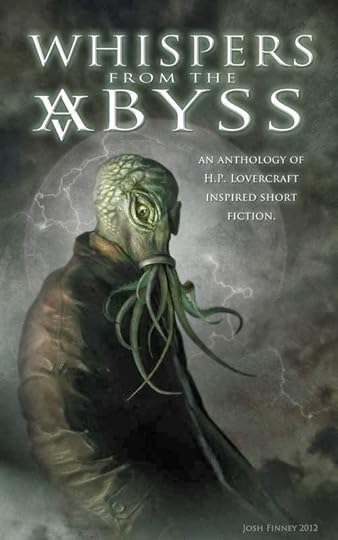 You know what? I'm confident it will, too. And my predictions are almost never wrong, except for how when every time it snows I predict that Ragnarok has finally come and, look sharp!, the Ice Giants will be marching over the horizon at any moment. That one, it's fair to say, has been consistently off. (Although I remain confident that one of these days I'll get it right.)
You know what? I'm confident it will, too. And my predictions are almost never wrong, except for how when every time it snows I predict that Ragnarok has finally come and, look sharp!, the Ice Giants will be marching over the horizon at any moment. That one, it's fair to say, has been consistently off. (Although I remain confident that one of these days I'll get it right.)Oh, while I'm at it, a quick nod for an anthology that isn't, so far as I know, up for any awards: 01 Publishing's Whispers From the Abyss anthology. I really enjoyed it, there are some fine stories in there, and if this is the sort of thing 01 are going to put out then I wouldn't be surprised if they too find themselves up for one of them shiny Stoker thingamajigs in the not too distant future.
Published on March 08, 2014 12:50
March 4, 2014
Game Ramble: Limbo
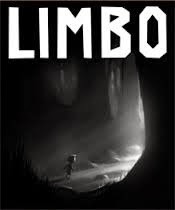 It seems to me that one of the things that hampers the ability of video games to tell good stories is their length: a modern game is likely to offer somewhere between eight and eighty hours of gameplay, and it's difficult to drag out a single compelling story arc to that kind of length, at least within such a predominantly visual medium.
It seems to me that one of the things that hampers the ability of video games to tell good stories is their length: a modern game is likely to offer somewhere between eight and eighty hours of gameplay, and it's difficult to drag out a single compelling story arc to that kind of length, at least within such a predominantly visual medium.One solution, the one generally favoured by Rockstar for example, is to pad out your plot with subplots and shorter arcs, and this can work to a degree, though I can't think of a single game where I've found it absolutely satisfactory*. The other, more common answer - perhaps the classic one - is to devolve the story into a series of quests, doling out plot advances as rewards. But while this fits more comfortably with the strictures of a game, it takes an awful lot of set dressing to make it feel like a genuine narrative. (I'd argue that the most recent Tomb Raider pulled it off, though barely.)
I think it's fair to say that the vast majority of games that put any serious effort into storytelling favour one or the other of those approaches. But not Limbo, of no.
And before I try and justify or explain that claim, it's worth pointing out that, as a game that can potentially be completed in under an hour, Limbo is of a length that actually could sustain a conventional narrative structure. Yet in fact the plot it has is so slender that, were this a film, it would struggle to fill ten minutes: a boy wakes in a strange world, comes across other boys who react to him with fear and hostility, eventually encounters a girl who may or may not be his sister, and continues onward, apparently looking for her.**
Not much plot at all, then, by the standards of any other medium ... and yet I'd argue that Limbo, in its own way, is a masterpiece of storytelling, and one of the most involving games I played last year. And the reason for that, I think, is that what it does with amazing subtlety is to tell many little - well, I guess we can't call them stories, as such, so let's go instead for the purposefully vague and made-up "narrative incidents" - that add up to something with the feel of a much bigger story. Which I suppose is a long way around saying it's all about the atmosphere, something Limbo is positively dripping with, and yet this is a game that does such a great impression of combining its every element - music, sound effects, design, gameplay - into something with the convincing feel of a story that it feels petty indeed to call it anything else.
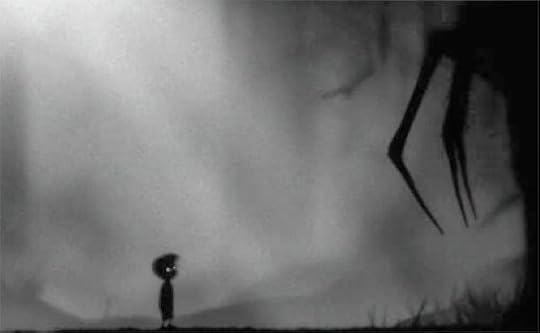 An example: Having survived a thoroughly nightmarish encounter with a giant spider, you - as Limbo's lost-child protagonist - stumble upon what at first glance appears to be another giant spider. But there's something not quite right about it, and as you draw near, it becomes apparent what: this isn't a real monster arachnid but a dummy made from metal and rope. And as you slip past its groping leg, the truth becomes clear: a boy of about your age is working a lever to control the contraption, and as he sees you he runs away in panic.
An example: Having survived a thoroughly nightmarish encounter with a giant spider, you - as Limbo's lost-child protagonist - stumble upon what at first glance appears to be another giant spider. But there's something not quite right about it, and as you draw near, it becomes apparent what: this isn't a real monster arachnid but a dummy made from metal and rope. And as you slip past its groping leg, the truth becomes clear: a boy of about your age is working a lever to control the contraption, and as he sees you he runs away in panic.Within the world of Limbo, that small first encounter tells so much: that you're not alone in this world, that others have had to contend with the same horrors that you have and learned to compete with them, that, yes, the traps you've come across were set by someone and that that someone is afraid of you, afraid enough to try and hurt you...
My point here - and I think I do have a point in mind for these Game Ramble articles, though I'm not quite there with working out what it is yet - is that video games are a new narrative medium, with new narrative rules that are still being figured out, and that perhaps Limbo points at a third way that can, in the right hands, be as or more successful than the two storytelling modes I started this article talking about. Because one of the things I love about video games is that they are absolutely not beholden to reality, or really to anything that's gone before; yet, even to this day they spend so much time imitating films, and to a lesser extent books, and to an even lesser extent paintings and sculpture and every damn art form that's come before. And really, why do that?
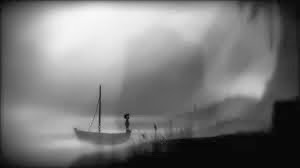 But Limbo is an example, and an intriguing one, of a narrative that could only possibly work in the medium it was created in. It's unapologetically a game; it tells its story through the player's interaction, and has almost no narrative outside that interaction. What it has, instead, is something that currently only gaming can offer: the ability to provide an alien space with its own logic and history - a space that's basically one big story - and let the player inhabit it, exploring, teasing out its secrets and, if you're up for it, ultimately trying to figure out its meaning.
But Limbo is an example, and an intriguing one, of a narrative that could only possibly work in the medium it was created in. It's unapologetically a game; it tells its story through the player's interaction, and has almost no narrative outside that interaction. What it has, instead, is something that currently only gaming can offer: the ability to provide an alien space with its own logic and history - a space that's basically one big story - and let the player inhabit it, exploring, teasing out its secrets and, if you're up for it, ultimately trying to figure out its meaning.* Red Dead Redemption probably coming the closest, but even that spun its wheels for a long time on some decidedly odd tangents.
** Not that even this much is stated, but - at the risk of *SPOILERS* - we can assume that's what's been happening from the ending.
Published on March 04, 2014 12:32
February 26, 2014
Research Corner #5: WW1 Reading Pt 2
As promised, I've been plowing on with the To End All Wars research, and not only that but I've been drifting into some decidedly odd waters, not to mention finding an excellent excuse to catch up with some of the TV watching I've missed these last few years. Without further ado...
Death's Men by Denis Winter
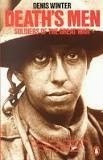 Probably the best of the non-fiction books I've read, and certainly the best of the non-fiction books I've read that deal specifically with the war, Winters' text is a perfect combination of authorial presence and carefully selected first-hand material; as an author he often drops away entirely from his own text, before bouncing back with such a wonderfully judged observation that you want to hug him for it. More often, though, I found myself being tremendously grateful for his being the one author who didn't at least passingly assume that I'd actually served through the First World War and was just refreshing my memory. For a work of such depth, it's nothing short of amazing that he thought to cover such necessary basics as the make-up of British army units and just exactly how a trench was supposed to be built.
Probably the best of the non-fiction books I've read, and certainly the best of the non-fiction books I've read that deal specifically with the war, Winters' text is a perfect combination of authorial presence and carefully selected first-hand material; as an author he often drops away entirely from his own text, before bouncing back with such a wonderfully judged observation that you want to hug him for it. More often, though, I found myself being tremendously grateful for his being the one author who didn't at least passingly assume that I'd actually served through the First World War and was just refreshing my memory. For a work of such depth, it's nothing short of amazing that he thought to cover such necessary basics as the make-up of British army units and just exactly how a trench was supposed to be built.
Complete Memoirs of George Sherston by Siegfried Sassoon
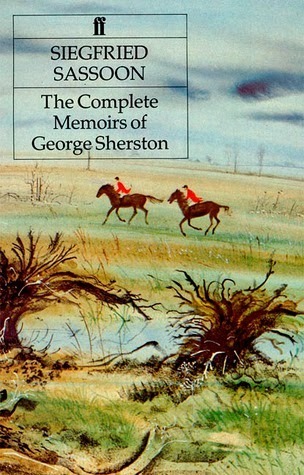 Complete on this occasion meaning three volumes and some six hundred pages, and its worth pointing out that the first of those volumes has barely a thing to do with the war but an awful lot to do with Sassoon's interest in fox hunting and, to a lesser extent, cricket. So if I tell you that there are no two subjects on earth I less want to know about, and then that I'm really glad I stuck with this, you'll perhaps get a sense of what an interesting, charming and - I think the precise word I'm looking for is companionable - writer Sassoon is. He's just an entertaining guy to spend time with is what I'm saying, and his memoirs are a fascinating insight into first a vanished way of life and then the war that eradicated it.
Complete on this occasion meaning three volumes and some six hundred pages, and its worth pointing out that the first of those volumes has barely a thing to do with the war but an awful lot to do with Sassoon's interest in fox hunting and, to a lesser extent, cricket. So if I tell you that there are no two subjects on earth I less want to know about, and then that I'm really glad I stuck with this, you'll perhaps get a sense of what an interesting, charming and - I think the precise word I'm looking for is companionable - writer Sassoon is. He's just an entertaining guy to spend time with is what I'm saying, and his memoirs are a fascinating insight into first a vanished way of life and then the war that eradicated it.
Of course, if you're only interested in the war then it's possibly advisable to skip that first volume, although I can't help thinking you'd lose a lot of Sassoon's thematic curve by doing so. (Of course, it's equally possible I'm only saying that because I suffered through it and so you should too.)
A Nurse at the Front: The First World War Diaries of Sister Edith Appleton, ed. by Ruth Cowen
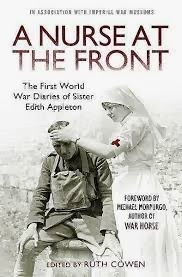 Diaries are a mixed bag when it comes to source material, what with that natural human inclination to write about any old rubbish when they think no one's looking, but Edith Appleton was good enough to produce exactly the sort of diary that people find interesting and useful a century later. She offers a terrific insight into WW1 nursing, into the war itself, and perhaps best of all, into the psychology of just what it was like to endure the almost unimaginable horror that she lived through and tried, with a startling amount of human decency, to mend in whatever ways she could. And, unlike the last war diary I read, this one is accompanied by plenty of footnotes, photos and supplementary material to go some way towards justifying the price tag.
Diaries are a mixed bag when it comes to source material, what with that natural human inclination to write about any old rubbish when they think no one's looking, but Edith Appleton was good enough to produce exactly the sort of diary that people find interesting and useful a century later. She offers a terrific insight into WW1 nursing, into the war itself, and perhaps best of all, into the psychology of just what it was like to endure the almost unimaginable horror that she lived through and tried, with a startling amount of human decency, to mend in whatever ways she could. And, unlike the last war diary I read, this one is accompanied by plenty of footnotes, photos and supplementary material to go some way towards justifying the price tag.
Downton Abbey Series 1
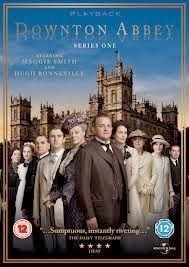 It was actually season 2 I wanted to watch, the bits where Downton gets turned into an officers' convalescence home being too perfectly suited to my needs to miss, but it seemed masochistic not to work my way up to that point via series 1 - and I'm glad I did. Sure, I have some bones to pick with Julian Fellowes's attempt to convince us all that early-C20th toffs were damnably lovely people and that early-C20th servants were treated with decency and respect rather than, say, cruelty and contempt, but you know what? This is still great telly, with superb production values. And as a whistlestop tour of the years leading up to the outbreak of the war, it was actually quite a help from a research point of view as well.
It was actually season 2 I wanted to watch, the bits where Downton gets turned into an officers' convalescence home being too perfectly suited to my needs to miss, but it seemed masochistic not to work my way up to that point via series 1 - and I'm glad I did. Sure, I have some bones to pick with Julian Fellowes's attempt to convince us all that early-C20th toffs were damnably lovely people and that early-C20th servants were treated with decency and respect rather than, say, cruelty and contempt, but you know what? This is still great telly, with superb production values. And as a whistlestop tour of the years leading up to the outbreak of the war, it was actually quite a help from a research point of view as well.
But say what you like about it, it still wasn't a patch on...
Birdsong
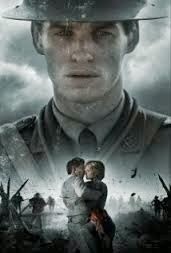 ...which, as someone who doesn't watch a great deal of TV, was pretty much a revelation. Seriously. is this what they're doing these days? Making subtle, challenging three hour programs with the production values of a mid-sized Hollywood production. Things sure have come on a long way since Byker Grove, that's for sure.
...which, as someone who doesn't watch a great deal of TV, was pretty much a revelation. Seriously. is this what they're doing these days? Making subtle, challenging three hour programs with the production values of a mid-sized Hollywood production. Things sure have come on a long way since Byker Grove, that's for sure.
Oh god, I feel old now.
Anyway, I've no idea how this holds up against the book, which I guess I probably should read, but regardless I enjoyed the hell out of it. Nice, too, that they didn't try to sugarcoat the blood and guts (as I'll surely be bitching about Downton Abbey Season 2 doing in the next of these posts.) Just a shame about the shonky CGI battlefields, but you can't have it all...
Conflict and Dreams by W. H. R. Rivers
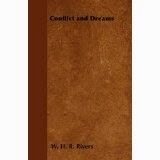 Yes, that W. H. R. Rivers! The dude who treated Siegfried Sassoon! Like what happened in Regeneration! They even made a movie of it and everything!
Yes, that W. H. R. Rivers! The dude who treated Siegfried Sassoon! Like what happened in Regeneration! They even made a movie of it and everything!
So anyway, I said the research was taking me down some odd avenues, and this is indeed a book of essays on the psychology of dreams (with, unsurprisingly, an emphasis on conflict.) As such, not an easy one to recommend to the casual reader, and you'll probably have to take my word for it when I say that it was actually really fascinating.
On a side note, this whole research binge is making me more and more cynical about the publishing industry, since (as you can tell from that "we're just not even pretending to try" cover) this is blatantly a public domain essay print-on-demanded into life and then slapped with a seven pound price tag. But maybe that's a moan for another time...
Death's Men by Denis Winter
 Probably the best of the non-fiction books I've read, and certainly the best of the non-fiction books I've read that deal specifically with the war, Winters' text is a perfect combination of authorial presence and carefully selected first-hand material; as an author he often drops away entirely from his own text, before bouncing back with such a wonderfully judged observation that you want to hug him for it. More often, though, I found myself being tremendously grateful for his being the one author who didn't at least passingly assume that I'd actually served through the First World War and was just refreshing my memory. For a work of such depth, it's nothing short of amazing that he thought to cover such necessary basics as the make-up of British army units and just exactly how a trench was supposed to be built.
Probably the best of the non-fiction books I've read, and certainly the best of the non-fiction books I've read that deal specifically with the war, Winters' text is a perfect combination of authorial presence and carefully selected first-hand material; as an author he often drops away entirely from his own text, before bouncing back with such a wonderfully judged observation that you want to hug him for it. More often, though, I found myself being tremendously grateful for his being the one author who didn't at least passingly assume that I'd actually served through the First World War and was just refreshing my memory. For a work of such depth, it's nothing short of amazing that he thought to cover such necessary basics as the make-up of British army units and just exactly how a trench was supposed to be built.Complete Memoirs of George Sherston by Siegfried Sassoon
 Complete on this occasion meaning three volumes and some six hundred pages, and its worth pointing out that the first of those volumes has barely a thing to do with the war but an awful lot to do with Sassoon's interest in fox hunting and, to a lesser extent, cricket. So if I tell you that there are no two subjects on earth I less want to know about, and then that I'm really glad I stuck with this, you'll perhaps get a sense of what an interesting, charming and - I think the precise word I'm looking for is companionable - writer Sassoon is. He's just an entertaining guy to spend time with is what I'm saying, and his memoirs are a fascinating insight into first a vanished way of life and then the war that eradicated it.
Complete on this occasion meaning three volumes and some six hundred pages, and its worth pointing out that the first of those volumes has barely a thing to do with the war but an awful lot to do with Sassoon's interest in fox hunting and, to a lesser extent, cricket. So if I tell you that there are no two subjects on earth I less want to know about, and then that I'm really glad I stuck with this, you'll perhaps get a sense of what an interesting, charming and - I think the precise word I'm looking for is companionable - writer Sassoon is. He's just an entertaining guy to spend time with is what I'm saying, and his memoirs are a fascinating insight into first a vanished way of life and then the war that eradicated it.Of course, if you're only interested in the war then it's possibly advisable to skip that first volume, although I can't help thinking you'd lose a lot of Sassoon's thematic curve by doing so. (Of course, it's equally possible I'm only saying that because I suffered through it and so you should too.)
A Nurse at the Front: The First World War Diaries of Sister Edith Appleton, ed. by Ruth Cowen
 Diaries are a mixed bag when it comes to source material, what with that natural human inclination to write about any old rubbish when they think no one's looking, but Edith Appleton was good enough to produce exactly the sort of diary that people find interesting and useful a century later. She offers a terrific insight into WW1 nursing, into the war itself, and perhaps best of all, into the psychology of just what it was like to endure the almost unimaginable horror that she lived through and tried, with a startling amount of human decency, to mend in whatever ways she could. And, unlike the last war diary I read, this one is accompanied by plenty of footnotes, photos and supplementary material to go some way towards justifying the price tag.
Diaries are a mixed bag when it comes to source material, what with that natural human inclination to write about any old rubbish when they think no one's looking, but Edith Appleton was good enough to produce exactly the sort of diary that people find interesting and useful a century later. She offers a terrific insight into WW1 nursing, into the war itself, and perhaps best of all, into the psychology of just what it was like to endure the almost unimaginable horror that she lived through and tried, with a startling amount of human decency, to mend in whatever ways she could. And, unlike the last war diary I read, this one is accompanied by plenty of footnotes, photos and supplementary material to go some way towards justifying the price tag.Downton Abbey Series 1
 It was actually season 2 I wanted to watch, the bits where Downton gets turned into an officers' convalescence home being too perfectly suited to my needs to miss, but it seemed masochistic not to work my way up to that point via series 1 - and I'm glad I did. Sure, I have some bones to pick with Julian Fellowes's attempt to convince us all that early-C20th toffs were damnably lovely people and that early-C20th servants were treated with decency and respect rather than, say, cruelty and contempt, but you know what? This is still great telly, with superb production values. And as a whistlestop tour of the years leading up to the outbreak of the war, it was actually quite a help from a research point of view as well.
It was actually season 2 I wanted to watch, the bits where Downton gets turned into an officers' convalescence home being too perfectly suited to my needs to miss, but it seemed masochistic not to work my way up to that point via series 1 - and I'm glad I did. Sure, I have some bones to pick with Julian Fellowes's attempt to convince us all that early-C20th toffs were damnably lovely people and that early-C20th servants were treated with decency and respect rather than, say, cruelty and contempt, but you know what? This is still great telly, with superb production values. And as a whistlestop tour of the years leading up to the outbreak of the war, it was actually quite a help from a research point of view as well. But say what you like about it, it still wasn't a patch on...
Birdsong
 ...which, as someone who doesn't watch a great deal of TV, was pretty much a revelation. Seriously. is this what they're doing these days? Making subtle, challenging three hour programs with the production values of a mid-sized Hollywood production. Things sure have come on a long way since Byker Grove, that's for sure.
...which, as someone who doesn't watch a great deal of TV, was pretty much a revelation. Seriously. is this what they're doing these days? Making subtle, challenging three hour programs with the production values of a mid-sized Hollywood production. Things sure have come on a long way since Byker Grove, that's for sure.Oh god, I feel old now.
Anyway, I've no idea how this holds up against the book, which I guess I probably should read, but regardless I enjoyed the hell out of it. Nice, too, that they didn't try to sugarcoat the blood and guts (as I'll surely be bitching about Downton Abbey Season 2 doing in the next of these posts.) Just a shame about the shonky CGI battlefields, but you can't have it all...
Conflict and Dreams by W. H. R. Rivers
 Yes, that W. H. R. Rivers! The dude who treated Siegfried Sassoon! Like what happened in Regeneration! They even made a movie of it and everything!
Yes, that W. H. R. Rivers! The dude who treated Siegfried Sassoon! Like what happened in Regeneration! They even made a movie of it and everything!So anyway, I said the research was taking me down some odd avenues, and this is indeed a book of essays on the psychology of dreams (with, unsurprisingly, an emphasis on conflict.) As such, not an easy one to recommend to the casual reader, and you'll probably have to take my word for it when I say that it was actually really fascinating.
On a side note, this whole research binge is making me more and more cynical about the publishing industry, since (as you can tell from that "we're just not even pretending to try" cover) this is blatantly a public domain essay print-on-demanded into life and then slapped with a seven pound price tag. But maybe that's a moan for another time...
Published on February 26, 2014 11:31
February 19, 2014
Film Ramble: Phase IV
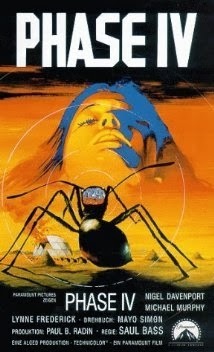 Phase IV was the feature debut of famed title sequence director Saul Bass - and since there aren't many people in the history of the human race who could justify being described as "famed title sequence director," it's worth adding that Bass, in his day job, was responsible for some of the most iconic imagery in film history. What springs to mind when you think of Vertigo? If it's the legendary title sequence or that inspired poster then it's Bass's work you're remembering, not Hitchcock's. And as well as Hitchcock, Bass was the designer of choice for directors like Preminger, Wilder, Kubrick and Scorsese.
Phase IV was the feature debut of famed title sequence director Saul Bass - and since there aren't many people in the history of the human race who could justify being described as "famed title sequence director," it's worth adding that Bass, in his day job, was responsible for some of the most iconic imagery in film history. What springs to mind when you think of Vertigo? If it's the legendary title sequence or that inspired poster then it's Bass's work you're remembering, not Hitchcock's. And as well as Hitchcock, Bass was the designer of choice for directors like Preminger, Wilder, Kubrick and Scorsese. But he only ever directed one feature film himself, and for that, he chose to make ... well, what is Phase IV exactly? In its crudest terms, it's the story of a tiny handful of humans - two at first and then three - battling super-intelligent ants in the American desert. Which makes it sound like THEM! or possibly Tremors, two films it has almost nothing in common with. It most certainly isn't a horror movie, though it has horror elements, and though it is a science-fiction movie, it's one far more absorbed with scientific process than technology or big ideas. In fact, through it's three distinct chapters it skips genre quite unapologetically, as the scale of the threat metamorphoses from "gee, these ants sure are getting feisty", through "gee, these ants are putting up a much better fight than you'd expect from, you know, ants," to ... well, that would be a spoiler, and to spoil Phase IV would be a shame, because amongst its many virtues are that it absolutely isn't like the film you're imaging if you haven't seen it and that it resolutely refuses to go to the places you're expecting even while you watch it.
None of which makes it any easier to describe, or to explain why it is absolutely one of the best and most under-rated science fiction films of the seventies, which as anyone who knows anything knows was the undisputed heyday for smart, ideas-based sci-fi. But perhaps the problem in describing it is Phase IV's greatest virtue; I can't think of another film where every single element is so subtly off-kilter, or where that perpetual, muted strangeness serves the film's ends so perfectly.
Watching it for perhaps the sixth time, though, what struck me even more forcefully is the film's lack of bias: we spend as much time with the ants - courtesy of some astonishing, how-the-hell-did-they-do-that? miniature shots and model work - as we do with the humans, watching their plans, their organization, all the minutiae of their minute existence. Some critics have suggested that a problem with the film is that we're never quite convinced of the ant threat, (they are, after all, just plain old normal-sized ants), but returning to it I can't help thinking that that's entirely deliberate. Phase IV is not an invasion movie. It's something closer to a faux-documentary, an aliens-eye view of a conflict in which humanity is but one side and - as personified by Nigel Davenport's fun portrayal of unbounded scientific hubris - not necessarily the one we should be rooting for.
In fact all of the film's immediate flaws - a wide-eyed performance from Lynne Frederick, the methodical pace, the fact that much of the filming was clearly sound stage-bound - become virtues by the end, when we come to appreciate just what it is we've been watching, and that it was never merely a tale of heroic scientists battling eeeeevil super-intelligent bugs. And the rest of its virtues are plain to see from the beginning: the unique, unsettling score, mixing guitar and electronica in a way that still feels current, the superlative insect photography, Bass's gloriously stylized direction and design aesthetic, and Mayo Simon's sparse script, which gives us exactly the information we need and not one word more.
So what is Phase IV? It's the absolutely definitive super-intelligent-ants-against-humanity pseudo-documentary art-house sci-fi movie, that's what ... and if that really isn't enough to make you want to see it then here's the trailer:
You can pick up the region 1 DVD (sadly there's never been a region 2 release) on Amazon here, at a currently very reasonable price. And lastly, for those who've already seen it, a couple of treats I discovered today: a link to the book adaptation and the original - very trippy, much less ambiguous - ending, cut after baffled test audiences ran screaming indifferently from the cinema:
Published on February 19, 2014 05:19
February 11, 2014
Auditory Self-Indulgence, Part 2
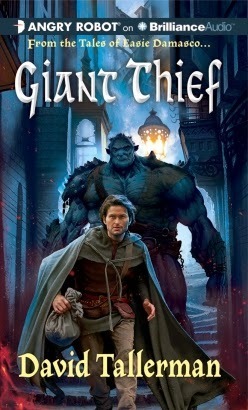 I think I've accumulated enough retrospect by now to say that my favourite thing about the Easie Damasco trilogy and their publication is that they ended up as three wonderful Brilliance Audio audiobooks that I then got to listen to.
I think I've accumulated enough retrospect by now to say that my favourite thing about the Easie Damasco trilogy and their publication is that they ended up as three wonderful Brilliance Audio audiobooks that I then got to listen to.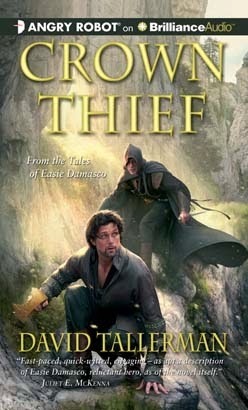 Because, yes, I listened to the audiobooks of my own novels. Wouldn't you? The thing is, if your books get made into audiobooks then, if you close your eyes, (and admittedly this isn't such a good idea in rough parts of town or while driving in heavy traffic), you get to imagine that someone's made a film of them, or at the very least put on an energetic stage adaptation. You get to experience them in a whole new way, through new eyes, and in a new voice, a voice that makes the weaker bits seem entirely decent and the good bits seem completely brilliant.
Because, yes, I listened to the audiobooks of my own novels. Wouldn't you? The thing is, if your books get made into audiobooks then, if you close your eyes, (and admittedly this isn't such a good idea in rough parts of town or while driving in heavy traffic), you get to imagine that someone's made a film of them, or at the very least put on an energetic stage adaptation. You get to experience them in a whole new way, through new eyes, and in a new voice, a voice that makes the weaker bits seem entirely decent and the good bits seem completely brilliant.At least, that's my experience. It may have a lot to do with the fact that I was lucky enough to get James Langton reading, and that James Langton is absolutely marvelous at this sort of thing. By the end of Prince Thief, I was in awe of the range of accents he'd pulled off over the course of three books, (and the fact that not one of them ended up sounding ridiculous), the fact that he put meat on the bones of even minor characters, made major characters seem like real people, and in particular brought scoundrelly, possibly-just-slightly-loveable rogue Easie Damasco to life in a way I'd never have dreamed possible.
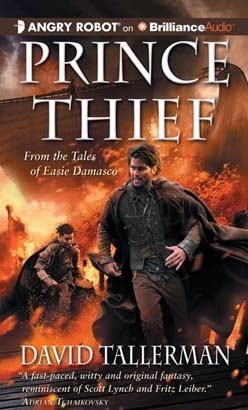 I guess what I'm saying, in a roundabout way, is that what James did wasn't just reading but acting; he literally, single-handedly acted out three books and dozens of characters, and that's just plain astonishing. I'm very glad I got to be the author of those three books, and that I then got to listen to James's take on them; it was a pleasure from the beginning of Giant Thief to the end of Prince Thief, and I'm not sure I'll ever get quite so lucky with a reader again. Many thanks to James and to the people at Brilliance who made it happen, not to mention the Angry Robot guys for putting the whole thing together in the first place.
I guess what I'm saying, in a roundabout way, is that what James did wasn't just reading but acting; he literally, single-handedly acted out three books and dozens of characters, and that's just plain astonishing. I'm very glad I got to be the author of those three books, and that I then got to listen to James's take on them; it was a pleasure from the beginning of Giant Thief to the end of Prince Thief, and I'm not sure I'll ever get quite so lucky with a reader again. Many thanks to James and to the people at Brilliance who made it happen, not to mention the Angry Robot guys for putting the whole thing together in the first place.Lastly ... I couldn't possibly pick a favourite character from the trilogy, but I think it would be okay to pick a favourite from the audio adaptations. And if I did it would surely be Malekrin, the sort-of-star of Prince Thief. There wasn't a single character I felt James got wrong, but Malekrin would have been awfully easy to mess up and James absolutely didn't: he captured all of Malekrin's early, youthful frustration and - let's face it! - total obnoxiousness, and then conveyed his growing pains across the course of the book, ending in a climatic scene that played out just the way it had in my head and got me a little bit emotional.
Which would have been all well and good had I not been walking down the high street of my grim northern home town. Still, I'm sure it's not the first time the good folk of Batley have seen a grown man get a little teary over the audiobook performance of a character he wrote.
Published on February 11, 2014 12:40



